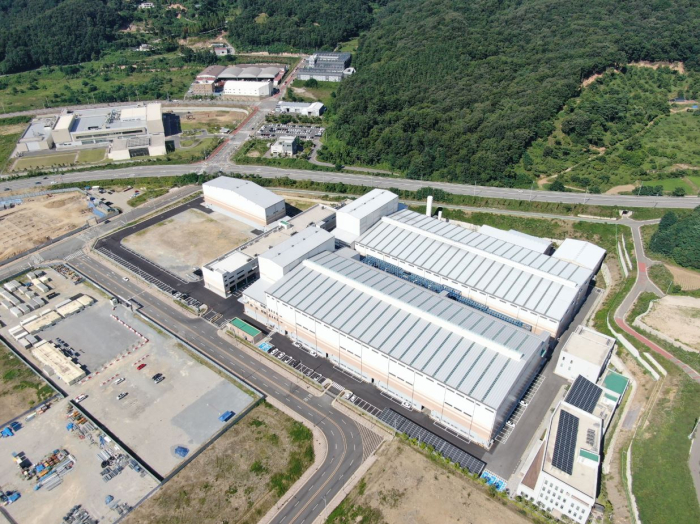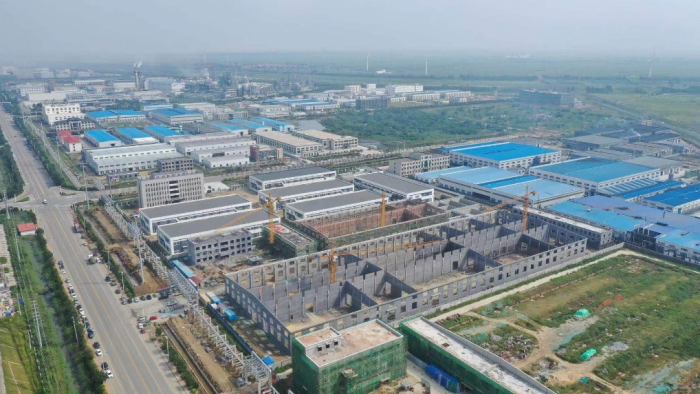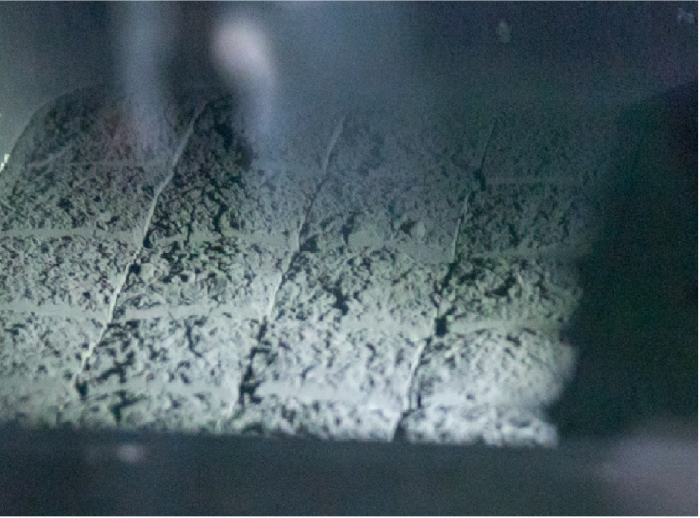POSCO Chem's rise from brickworks to EV materials leader
The POSCO unit expands into the synthetic graphite market with a $22 mn investment in Chinese manufacturer
By Nov 11, 2021 (Gmt+09:00)
CarlyleŌĆÖs Rubenstein sees commercial real estate undervalued


Infrastructure secondaries continue to rise amid inflation: Stafford


Goldman Sachs names Choi Seoul office chief


Golf equipment maker Taylormade to refinance $222 mn of debt


NPS' former key players move to law firms as its voting power increases



POHANG, South Korea - When POSCO Chemical Co., better known as a refractory brick manufacturer until the early 1990s, announced its entry into the anode materials market for rechargeable batteries in 2010, South Korea had relied almost entirely on imports of the materials from Japan. At the time, the country's self-sufficiency rate for negative electrode materials stood at a mere 0.1%.┬Ā
"We couldn't even dream of making money within 10 years, but we were determined to contribute to making our country rich with our materials business," said Kim Do-hyung, POSCO Chemical's research head for energy raw materials.
Their first step into the uncharted territory was looking through relevant research papers.
"We can disassemble a product to learn how to make it, but can't do that for materials. We weren't sure if we could play catch-up back then."
It took 10 years to make its dreams a reality. The arm of South Korean steel giant POSCO Co. has now become the country's only producer of both anode and cathode materials used in electric vehicle batteries.
The company's successful transformation into a materials producer has driven a twelvefold spike in its share price over the past five years. But stock analysts see it has room to rise further.
As a manufacturer of refractory bricks used in furnaces, the 58-year-old company posted only 1% growth in annual sales between 1995 and 2000. But its first diversification in 2007 into quicklime, used in the production of iron, steel, paper and pulp, paid off. Its share price soared almost 10 times between 2007 and 2010.
But the company was never complacent about its success and went on the hunt for new growth drivers.
VERTICAL INTEGRATION OF ANODE MATERIALS PRODUCTION
In 2010, it acquired what was then Carbonics from South Korea-based LS Mtron Ltd. The anode materials company was set up by ex-employees of POSCO's research institution, who had absorbed anode materials-manufacturing technology from Japan's Showa Denko.
Eleven years later, the POSCO unit has now completed the vertical integration of its anode materials business from raw materials procurement to processing to production.
On Nov. 10, the company announced the purchase of a 15 percent stake in Inner Mongolia Sinuo New Material Technology Co., a Chinese manufacturer of synthetic graphite, for 26.1 billion won ($22 million). With the stake purchase, it becomes the top shareholder in the Chinese company with an annual production capacity of 20,000 tons of anode materials.
It is now able to produce both natural and synthetic graphite used for anode materials. Kim, the POSCO research head, predicts that synthetic graphite will take a bigger share in the graphite market as it helps extend battery lifespan and reduce charging time.┬Ā
In line with enormous growth in the EV market, synthetic graphite will account for as much as 73% of the graphite market by 2025, from 60% in 2020, according to SNE Research.
┬Ā

The series of recent acquisitions helped POSCO Chem build an entire value chain of anode materials production. Last September, it acquired a 13% stake in Qingdao Zhongshuo New Energy Technology Co., a Chinese graphite processor, to secure a stable supply of spherical graphite.
In January of this year, it acquired a 15% stake, valued at around $7.5 million, in Black Rock Mining, an Australia-based mining company that owns the Mahenge graphite mine in Tanzania, Africa.
POSCO Chem also decided to produce pitch, a material used for coating anode materials, at home. It also has begun producing needle-type petroleum coke, a raw material of synthetic graphite, since it established PMCTECH this month.
It plans to expand its annual capacity of anode materials production to 172,000 tons by 2025 and 260,000 tons by 2030, versus this year's 44,000 tons.

ENTRY INTO CATHODE MATERIALS MARKET
To advance into the cathode materials market, it launched a joint venture in 2012 with Phoenix Materials Co. of South Korea's Bogwang Group. Its entry into the market then met with a frosty response from investors and industry watchers, who questioned its capabilities of handling both anode and cathode materials for EV batteries.┬Ā
"It was like creating something from nothing," Kim said. "Korean corporate culture, pushing ahead to achieve goals without fail, motivated us to become a global leader."
Now it is ranked ahead of Japanese rivals in the battery materials market. POSCO Chem aims to boost its capacity of cathode materials to 275,000 tons by 2024.
In 2015, it succeeded in producing lithium manganate (LMO) cathode materials and in 2017 began manufacturing NCM-based cathode materials, composed of lithium, nickel, cobalt and manganese, currently the most popular battery type.
Estimated earnings for POSCO Chemical: ┬Ā ┬Ā ┬Ā
| Sales | Operating profit | |
| 2021 | 1.97 trillion won | 138.7 billion won |
| 2022 | 2.5 trillion┬Ā won | 182 billion won |
| 2023 | 3.5 trillion won | 258.3 billion won |
| (Source: FnGuide) | ||
In the domestic stock market, POSCO Chem has been at the forefront of EV battery materials makers. Its share price more than doubled to 185,000 won in February of this year from 68,000 won at end-October 2020, based on expectations of its capacity expansion.
As part of the company's efforts to internalize the production of battery materials, it began producing precursors, used in cathode materials as well as lithium, a key component of EV batteries.
POSCO Chem is now working on cathode materials for use in batteries made of nickel, cobalt, manganese and aluminum (NCMA), a next-generation battery high in nickel content.
"We have secured significant levels of technology for silicon anode materials as well," Kim added.
Write to Yoon-sang Koh at kys@hankyung.com
Yeonhee Kim edited this article.
-

-
 Battery materialsPOSCO Chemical to expand EV battery materials capacity in China
Battery materialsPOSCO Chemical to expand EV battery materials capacity in ChinaAug 25, 2021 (Gmt+09:00)
1 Min read -
 EV materialPOSCO Chem to build cathode factories in EU, US from 2022
EV materialPOSCO Chem to build cathode factories in EU, US from 2022Apr 18, 2021 (Gmt+09:00)
3 Min read


